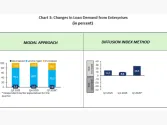
Asian investors worry over Fed tapering, property bubbles
GDP growth forecast across EM Asia fell to 5.7%.
Asian investors are concerned about reduced monetary easing by global central banks and its effect on credit conditions across Asia-Pacific (APAC), according to the first of Fitch Ratings' regional cross-sector investor survey.
"We believe the key credit risks are likely to be limited to specific issuers, and that widespread sovereign, banking or corporate credit distress remains unlikely," said Fitch.
Here's more from Fitch Ratings:
As many as 87% of respondents thought a reduction of quantitative easing by major central banks was the main risk to APAC credit markets. This was higher than the proportion of those who felt the key risks arose from property bubbles within the region (57%).
On balance, investors were relatively relaxed regarding other potential threats, with a majority rating all other risks as low.
Concerns about a prolonged recession in the US and Europe, and escalating regional geo-political risk - involving China, Japan, and the Korean peninsula - ranked lowest, while a "hard landing" in China and a failure of Abenomics were of slightly more concern.
Investor concerns were particularly focused on south Asia, with 80% of respondents anticipating a further economic slowdown in India, followed by 76% expecting the same in Indonesia.
From a sector perspective, 68%-70% of investors thought the region's emerging market (EM) sovereigns and corporates would see deteriorating conditions in external bond markets.
The results are broadly in line with Fitch's bi-annual Risk Radar cross-sector survey. In that report, the main downsides were the combination of a reversal in loose monetary conditions and slower growth across the region.
The likelihood of a China hard landing remains remote, but asset-quality deterioration in the region's banks is viewed as the main near-term risk.
Survey results are also mirrored by data from Dealogic which highlights a slump in cross-border issuance by the region's banks, corporations and sovereigns in Q313.
However, the recent unexpected postponement of the Fed's tapering may have eased the access to credit markets for several issuers, albeit temporarily.
Fitch believes that credit stresses will be contained in specific sectors. The region is fundamentally more resilient than in earlier decades to a drain of global liquidity, and we do not see a repeat of the "Asian Financial Crisis" of 1997.
The agency has lowered GDP growth projections across EM Asia to 5.7% for this year and 5.8% for the next, from earlier projections of 6%+ in both years. But the slowdown is largely credit neutral. Lower growth may eventually help take some steam out of the market, and lower the threat of a further run-up in asset-price bubbles.
The ratings of several Indian banks have been lowered recently due to further asset-quality deterioration amid a more prolonged slowdown.
But liquidity and capital at sovereigns, banks and corporations across the region provide a credit buffer against conceivable shocks. As such, regional ratings incorporate vulnerabilities but also have a tolerance for some degree of market volatility.
Fitch conducted the survey between 20 August and 30 September. It represents the views of 72 senior fixed-income investors in the APAC region, including asset management companies, sovereign wealth funds, insurance companies, pension funds, wealth managers, banks and hedge funds. We will publish the full survey results in mid-October.















